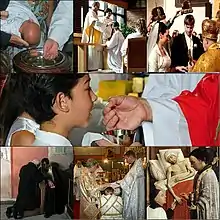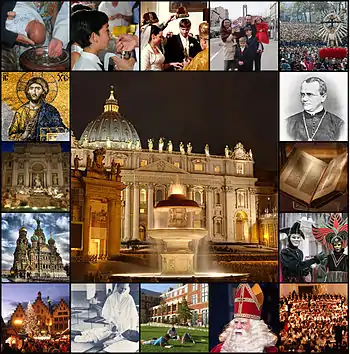الهوية المسيحية
الهوية المسيحية هي وصف موضوعي أو ذاتي لفرد ما كمسيحي وإلى كونه مسيحيًا.[1] وبموجب التعريف الأوسع، تعريف الهوية المسيحيّة لا يتوقف على عدم اعتبار الشخص كمسيحي من قبل الآخرين، أو من قبل التعاريف التي تتبع القواعد الدينيّة، أو القانونيّة، أو الاجتماعية. الهوية المسيحيّة لا تتوقف فقط على مفهوم العقيدة الدينية.

وفقًا لذلك، يمكن أن تكون الهوية المسيحيّة هوية ثقافيّة أيضًا. الأفراد المرتبطين في الهوية المسيحيّة يمكن أن ينطوي على علاقات مع المجتمع المسيحي. في التقاليد المسيحيّة الرئيسيّة تعتمد تحديد وتعريف مسيحي على طقوس مسيحية دينية وهي طقس المعمودية ويُمّثِل هذا الطقس دخول الإنسان الحياة المسيحية والمجتمع المسيحي. استنادًا للمعتقدات المسيحية عمومًا والكاثوليكية خصوصًا يعتبر العماد ختم أبدي وبالتالي كل شخص نال سر المعمودية يبقى مسيحيًا حتى الممات،[2] بغض النظر عن المعتقدات الشخصية أو مستوى الالتزام الديني. وقد يتماهى الملحدين المسيحيين مع الهوية المسيحيّة ومن أبرز هذه الفئة ريتشارد دوكينز.[3]
أسس الهوية المسيحية
يمكن فصل الهوية المسيحيّة إلى أربعة أسس منفصلة ومستقلة:
- الانقسامات العرقية: في العديد من الجماعات العرقيّة والإثنيّة تُعتبر المسيحية جزء مركزي في تركيب الهوية الإثنية والوطنيّة لتلك الشعوب ومن بين هذه المجموعات التي ترى المسيحيًّة كجزء من هويتها الثقافية والتاريخيَّة؛ الإثنيات الدينيَّة المسيحيَّة مثل المسيحيون العرب (الروم الأنطاكيون)،[4] والموارنة،[4] والأقباط،[5] والآشوريين والسريان،[6] والأرمن،[7] ومسيحيو مار توما،[8] والأميش،[9] والمينونايت،[10] والمورمون،[11] والهوتريتيون،[12] والأيرلنديون الكاثوليك،[13] وكاثوليك مانغلور وكاثوليك غوان. كما وتملك الشعوب الأرثوذكسيّة في أوروبا الشرقية والبلقان كنائس وطنيَّة وقوميَّة خاصة بها ومنهم الجورجيون،[14] والبيلاروس، والبلغار،[15] واليونانيون،[16] والمقدونيون،[17] والرومانيون، والروس،[18] والصرب،[19] والقبارصة والأوكرانيون.[20] وتُعد الثقافة البروتستانتية بالنسبة لعدد من شعوب أوروبا الشمالية جزء من الهوية الوطنية والشعبيَّة ومنهم الشعب الإنجليزي،[21] والاسكتلنديّ،[22] والأنجلو إيرلندي، والويلزيّ، والسويدي،[23] والفنلندي،[24] والنرويجي،[25] والدنماركي،[26] والألماني،[27] والإستوني،[28] واللاتفي والهولندي وغيرهم. كما وأضحت الثقافة الكاثوليكية الهوية السائدة والموحدة للشعب النمساوي،[29] والإسباني،[30] والبرتغالي، والإيطالي، والفرنسي، والبلجيكي،[31] والكرواتيّ،[32] والآيرلندي، والمجري،[33] والبولندي، إلى جانب الفلبينيون وشعوب أمريكا اللاتينية مثل الأرجنتينيون،[34] والبرازيليون،[35] والكولومبيون، والشعب المكسيكي،[36] وغيرهم من الهسبان والأمريكيين اللاتينيين. وفقًا للمؤرخ الفرنسي فرناند بروديل فالإنسان الأوروبي متدينًا كان أو ملحدًا فإنّ ردود فعله النفسيّة، وسلوكه، وأخلاقيته، ظلت متجذّرة في التّراث المسيحي الذي طبع الحياة الأوروبيّة بطابعه على مدار القرون المتطاولة. وقد وصف المؤرخ بروديل الإنسان الأوروبي على إنّه من «دم مسيحيّ».[37]
- الديانة المسيحية: تشمل الأفراد المسيحيين الذين يتبعون التعاليم الدينية المسيحية والتي تلتزم في التردد والذهاب إلى الكنيسة، والتي لديها مستوى عال من النشاط الروحي والاعتراف بسلطة الكنيسة وتلتزم بمداومة الصلوات التقليدية مثل صلوات الساعات والمسبحة الورديَّة ودرب الصليب ودراسة الكتاب المقدس. فضلًا عن المسيحي الكتابي،[38] والمسيحي المتلزم،[39] ومعتنق المسيحية والمسيحي المؤمن.[40] وتُلقى هذه المصطلحات رواج بين المسيحيين الأصوليين والإنجيليين حيث يعتبرون المسيحي الحق هو الشخص المؤمن بيسوع المسيح ويقبله مخلصًا شخصيًا لنفسه وممارس لدينه بشكل يومي ولا يكفي أن يكون الشخص مولود كمسيحي.
- الثقافة المسيحية: وتشمل المسيحيين الذين في اتصال مع تراثهم الحضاري المسيحي وليس من خلال المعتقدات الدينية وإنما من خلال اللغة والأدب، والتعليم، والفن، والفن المعماري، والموسيقى، والغذاء، والإحتفالات للمسيحيين.[41]
- الإنتماء الطائفي: يؤمن المسيحيون بأنّ «كل معمّد منتمي لكنيسة يسوع المسيح بغض النظر عن المذهب الذي ينادي به أو الطقس الذي يتبعه»،[42][43] الطوائف الأربعة الكبرى التي تشكل 99% من المسيحيين هي، الكنيسة الكاثوليكية،[ملاحظة 1] والكنيسة الأرثوذكسية الشرقية، والكنيسة الأرثوذكسية المشرقية، والكنائس البروتستانتية.[ملاحظة 2][44] تتضمن الطوائف المسيحية الأصغر حجماً كنيسة المشرق[ملاحظة 3] والمسيحية اللا طائفية. هناك أقلية من المسيحيين لاثالوثية،[45] من الناحية التاريخّية كانت من بين أبرز الطوائف المسيحية اللاثالوثية كل من مذهب الآريوسية والأبيونية والكاثار والربوبية المسيحية. أمّا في العصور الحديثة يتوزع المسيحيين اللاثالوثيين على كنيسة يسوع المسيح لقديسي الأيام الأخيرة، وشهود يهوه، والتوحيدية، وكنيسة الوحدة، وجماعة العلم المسيحي والأخوة المسيحية. وتعتبر هذه الكنائس جزء من عائلة الطوائف المسيحيَّة، ويعرف أتباع هذه الكنائس أنفسهم كمسيحيين.
التعبير عن الهوية المسيحية
يأخذ التعبير عن الهوية المسيحيّة أشكال متعددة مثل الحفاظ على العادات والتقاليد المسيحية المتعلق بالقيم الأسرية، وينظر إلى الحفاظ على العادات والتقاليد بأنها قيم عائلية وتعليمية مهمة، فضلًا عن ذلك قد تعني الهوية المسيحية لبعض المسيحيين أن تكون مسيحيًا هي أن تكون جزء حيوي من الثقافة المحلية المشبعة في المسيحية دون العيش بالضرورة في الالتزام الديني.[46] يظهر ذلك في الدراسة في المدارس والجامعات المسيحية والذهاب إلى الكنيسة في الأعياد الدينية والمناسبات الاجتماعية والعائلية مثل حفلات الزفاف والعماد والجنازة وزيارة قبور الأقارب ووضع رموز دينية مثل الصليب والأيقونات وحمل أسماء مسيحية وممارسة طقوس مثل العماد وأول قربانة والأسرار السبعة المقدسة ورسم إشارة الصليب على الجباه في أربعاء الرماد والاحتفال في الأعياد المسيحية خاصًة العائلية منها مثل عشية عيد الميلاد وتلوين بيض عيد الفصح والمشاركة في التطوافات الدينية مثل تطوافات الأسبوع المقدس أو عادة الصيام عن اللحوم يوم الجمعة أو الصلاة قبل الطعام.[47][48]
وقد يتم التعبير عن الحفاظ على الهوية المسيحية من خلال الحفاظ على الدراسة في المدارس المسيحية أو الجامعات المسيحية. ويتم التعبير عن الهوية المسيحية من خلال المناسبات الدينية مثل عيد الميلاد حيث يحافظ المسيحيين على مظاهره والتي تكون على شكل إعطاء الهدايا ووضع شجرة الميلاد ووجود شخصية بابا نويل الأسطورية وعشاء الميلاد والاجتماعات العائلية وحضور قداس نصف الليل والتردد على الكنائس.[49]
كما أن بعض المسيحيين يُعَمِّدون أبنائهم باعتباره نوع من القيم التقليدية المسيحية والتي هي جزء من هويتهم الثقافية في حين أن البعض الآخر كشكل عقائدي بحت وللتعبير عن الإيمان في العقائد المسيحية، هذا بالإضافة إلى اعتبارهم الكتاب المقدس والليتورجيا والفن والموسيقى الكنسية جزء من ثقافتهم وقيمهم.[47]
 العماد وهو سر دخول المرء في المسيحية
العماد وهو سر دخول المرء في المسيحية أول قربانة، يتم فيه نيل سر الأفخارستيا ويُعتبر حدث عائلي وديني وثقافي
أول قربانة، يتم فيه نيل سر الأفخارستيا ويُعتبر حدث عائلي وديني وثقافي زفاف في كنيسة حسب الطقوس الأرثوذكسية الشرقية ويتم الزفاف بمباركة رجل الدين
زفاف في كنيسة حسب الطقوس الأرثوذكسية الشرقية ويتم الزفاف بمباركة رجل الدين
.jpg.webp) تطواف جمعة الآلام، تعتبر التطوافات جزء من الثقافة المسيحية الشعبية
تطواف جمعة الآلام، تعتبر التطوافات جزء من الثقافة المسيحية الشعبية
مراجع
- Patrick Johnstone and Jason Mandryk, Operation World: 21st Century Edition (Paternoster, 2001), 13–14.
- "The Sacrament of Baptism (§1272)"، Catechism of the Catholic Church، مؤرشف من الأصل في 6 أغسطس 2011، اطلع عليه بتاريخ أكتوبر 2020،
Baptism seals the Christian with the indelible spiritual mark (character) of his belonging to Christ. No sin can erase this mark, even if sin prevents Baptism from bearing the fruits of salvation. Given once for all, Baptism cannot be repeated.
{{استشهاد ويب}}: تحقق من التاريخ في:|تاريخ الوصول=(مساعدة) - قالب:En sprog "Dawkins: I'm a cultural Christian"، بي بي سي News، 10. december 2007، مؤرشف من الأصل في 10 أغسطس 2017.
{{استشهاد بخبر}}: تحقق من التاريخ في:|تاريخ=(مساعدة) - Minahan 2002, p. 1194
- Makari, Peter E. (2007)، Conflict & Cooperation: Christian-Muslim Relations in Contemporary Egypt، Syracuse University Press، ص. 42، ISBN 9780815631446،
The Coptic Orthodox Church is the historic, and national, church of Egypt and is deeply tied to a monastic tradition of spiritual growth and preparation for ministry of monks and nuns, a tradition that continues to thrive.
- Murre-van den Berg, Heleen (2011)، "Syriac Orthodox Church"، في Kurian, George Thomas (المحرر)، The Encyclopedia of Christian Civilization، Wiley-Blackwell، ص. 2304، ISBN 978-1-4051-5762-9.
- Dekmejian, R. Hrair (1994)، "Reviewed Work: Revolution and Genocide: On the Origins of the Armenian Genocide and the Holocaust by Robert F. Melson"، The International History Review، 16 (2): 377، JSTOR 40107201،
...both victimized groups [Armenians & Jews] were ethno-religious minorities...
- Pallan, M (2018) Ethnocultural Transformation of Social Identity. Syrian Christians in Kerala. Chapter 2 and 6. Grin Verlag. (ردمك 9783668858749)
- Simon Harrison (2006)، Fracturing Resemblances: Identity and Mimetic Conflict in Melanesia and the West، Berghahn Books، ص. 121–، ISBN 978-1-57181-680-1، مؤرشف من الأصل في 16 مايو 2020.
- Thiessen, Janis Lee (17 يونيو 2013)، Manufacturing Mennonites: Work and Religion in Post-War Manitoba (باللغة الإنجليزية)، University of Toronto Press، ISBN 9781442660595، مؤرشف من الأصل في 16 مايو 2020.
- "Part I - Mormons as an Ethno-Religious Group - University Publishing Online"، ebooks.cambridge.org، مؤرشف من الأصل في 16 مايو 2020، اطلع عليه بتاريخ 24 يناير 2016.
- Janzen, Rod؛ Stanton, Max (01 سبتمبر 2010)، The Hutterites in North America (باللغة الإنجليزية)، JHU Press، ISBN 9780801899256، مؤرشف من الأصل في 16 مايو 2020.
- Evans, Jocelyn؛ Tonge, Jonathan (2013)، "Catholic, Irish and Nationalist: evaluating the importance of ethno-national and ethno-religious variables in determining nationalist political allegiance in Northern Ireland"، Nations and Nationalism، 19 (2): 357–375، doi:10.1111/nana.12005.
- Melton, J. Gordon؛ Baumann, Martin (21 سبتمبر 2010)، Religions of the World: A Comprehensive Encyclopedia of Beliefs and Practices، ABC-CLIO، ص. 1195، ISBN 9781598842043،
The Georgian Orthodox Church (GOC) is the Eastern Orthodox Christian body that serves as the national church of the Caucasian country of Georgia. The great majority of Georgians are members of the church.
{{استشهاد بكتاب}}: صيانة CS1: التاريخ والسنة (link) - Hall, Richard C. (01 يناير 2012)، The Modern Balkans: A History، Reaktion Books، ص. 51، ISBN 9781780230061،
While this did not restore the Ohrid patriarchate, it did acknowledge the separation between the Orthodox church in Constantinople and the Bulgarian Orthodox church, which was now free to develop as the Bulgarian national church.
- Miller, James Edward (2009)، The United States and the Making of Modern Greece: History and Power, 1950-1974، Univ of North Carolina Press، ص. 12، ISBN 9780807832479،
The creation of a national church of Greece, which the patriarch reluctantly recognized in 1850, set a pattern for other emerging Balkan states to form national churches independent of Constantinople.
- Rae, Heather (15 أغسطس 2002)، State Identities and the Homogenisation of Peoples، Cambridge University Press، ص. 278، ISBN 9780521797085،
The creation of a national Church was also central to building national identity, with the Macedonian Orthodox Church (MOC) established in 1967, much to the outrage of the Serbian Orthodox Church.
{{استشهاد بكتاب}}: صيانة CS1: التاريخ والسنة (link) - Prizel, Ilya (13 أغسطس 1998)، National Identity and Foreign Policy: Nationalism and Leadership in Poland, Russia and Ukraine، Cambridge University Press، ص. 155، ISBN 9780521576970،
Although nominally a national church, the Russian Orthodox Church developed from a defensive, nativist institution to the ideological foundation of an imperial idea.
- Tomasevich, Jozo (01 يناير 1975)، The Chetniks، Stanford University Press، ص. 176، ISBN 9780804708579،
He also had the support of the Serbian Orthodox Church, which as a national church long identified with the national destiny and aspirations of the Serbian people was naturally inclined to identify itself with the movement that had the backing of the king and the Servian-dominated government-in-exile.
- Velychenko, Stephen (01 يناير 1992)، National History as Cultural Process: A Survey of the Interpretations of Ukraine's Past in Polish, Russian, and Ukrainian Historical Writing from the Earliest Times to 1914، Canadian Institute of Ukrainian Studies Press، ص. 199، ISBN 9780920862759،
For this reason the Ukrainian Orthodox Church was the true democratic national church of the Ukrainian nation.
- Britannicus (1834)، The Church of England، ص. 17، مؤرشف من الأصل في 16 مايو 2020،
Having, in my last, arrive at the great points which I wished to establish--the apostolicity, independence, and authority of the Church of England; and that she is necessarily the National Church, because Christianity is the National Religion.
- Morton, Andrew R. (1994)، God's Will in a Time of Crisis: A Colloquium Celebrating the 50th Anniversary of the Baillie Commission، Edinburgh: CTPI، ص. 14، ISBN 9781870126274، مؤرشف من الأصل في 16 مايو 2020،
In October 1929, the Established Church and the United Free Church were united to form the national Church of Scotland.
- Gilley, Sheridan؛ Stanley, Brian (2006)، The Cambridge History of Christianity: Volume 8, World Christianities C.1815-c.1914، Cambridge University Press، ص. 354، ISBN 9780521814560،
The Church of Sweden could be characterised as 'national church' or 'folk church', but not as 'state church', because the independence of the church was expressed by the establishment of a Church Assembly in 1863.
- Denmark, Finland, and Sweden، Britanncia Educational Publishing، 01 يونيو 2013، ص. 77، ISBN 9781615309955،
One of Finland's national churches is the Evangelical Lutheran Church of Finland (Finnish: Suomen Evankelis—luterilainen—kirkko), or simply the Church of Finland.
{{استشهاد بكتاب}}: تحقق من التاريخ في:|سنة=/|تاريخ=mismatch (مساعدة) - Cristofori, Rinaldo؛ Ferrari, Silvio (28 فبراير 2013)، Law and Religion in the 21st Century: Relations between States and Religious Communities، Ashgate Publishing, Ltd.، ص. 194، ISBN 9781409497332،
The State shall support all religious communities including the Church of Norway on an equal footing, but the Church of Norway shall 'remain the people's Church and is as such supported by the State', thereby upholding its function as a national Church.
- Venbrux, Eric؛ Quartier, Thomas؛ Venhorst, Claudia؛ Brenda Mathijssen (سبتمبر 2013)، Changing European Death Ways، LIT Verlag Münster، ص. 178، ISBN 9783643900678،
Simultaneously the church tax, ministers being public servants, and the status of the Evangelical Lutheran Church of Denmark as the national church indicate that the state lends its support to the church.
- Gelder, Craig Van (2008)، The Missional Church and Denominations، Wm. B. Eerdmans Publishing، ص. 71، ISBN 9780802863584،
Germany's two churches (the National Church for the Protestants and the Roman Catholic Church) were “proper”with respect to their polities.
- Elvy, Peter (1991)، Opportunities and Limitations in Religious Broadcasting، Edinburgh: CTPI، ص. 23، ISBN 9781870126151،
Denominationally Estonia is Lutheran. During the time of national independence (1918-1940), 80% of the population belonged to the Lutheran National Church, about 17% were Orthodox Christians and the rest belonged to Free Churches.
- David Bowman, William (01 ديسمبر 1999)، Priest and Parish in Vienna: 1780 to 1880، Boston, MA : Humanities Press، ص. 1، ISBN 9780391040946،
The Catholic Church was one of the principal forces that could help keep the lands of Habsburg monarchy together throughout its long history. Catholicism was not only the traditional religion of much of Austrian society,
- Spanish Catholicism: an Historical Overview Stanley Payne - University Of Wisconsin Press - 1984 (ردمك 0299098044)
- Nationalism in Belgium: Shifting Identities, 1780-1995 نسخة محفوظة 2020-05-16 على موقع واي باك مشين.
- Cvitanic, Marilyn (2011)، Culture and Customs of Croatia، 9780313351174، ISBN 9780313351174.
- Alex Kish, George (2011)، The Origins of the Baptist Movement Among the Hungarians: A History of the Baptists in the Kingdom of Hungary From 1846 to 1893، BRILL، ص. 18، ISBN 9789004211360،
the empire the Crown still championed Roman Catholicism as "the Hungarian national religion"
- SJ, Gustavo Morello (01 يوليو 2015)، The Catholic Church and Argentina's Dirty War، Oxford University Press، ص. 4، ISBN 9780190273002،
The "re-establishing" of Catholicism as a national Church was the reward for the bishops's silence.
- "Yet the national church appeared to agree upon the approach to pre-influence and it behaved accordingly. The Brazilian Church was socially more advanced than any other Latin America Church" The Political Transformation Of the Brazilian Catholic Church Thomas Bruneau - Umi Out-of-print Books on Demand - 1989
- Roberto Blancarte, "Recent Changes in Church-State Relations in Mexico: An Historical Approach." Journal of Church & State, Autumn 1993, Vo-559 (1996).
- عصر النّهضة الأوروبيّة : في مرآة المؤرّخ الفرنسي الشّهير فرنان بروديل، الأوان، 19 أكتوبر 2012. [وصلة مكسورة] نسخة محفوظة 1 يوليو 2015 على موقع واي باك مشين.
- Patrick Morley, The Man in the Mirror: Solving the 24 Problems Men Face (1997), Biblical Christian or Cultural Christian? نسخة محفوظة 5 مارس 2020 على موقع واي باك مشين.
- Richard W. Rousseau, Christianity and Judaism: the deepening dialogue (1983), p. 112 نسخة محفوظة 5 مارس 2020 على موقع واي باك مشين.
- Postmodern theology: Christian faith in a pluralist world, Harper & Row, 1989 . Joseph C. Aldrich, Life-style evangelism: crossing traditional boundaries to reach the unbelieving world , 1983 "cultural+Christian"+-"multi-cultural+Christian"+-"cross-cultural+Christian"&dq="cultural+Christian"+-"multi-cultural+Christian"+-"cross-cultural+Christian"&hl=en&ei=cCcsTqKONoaw8gPhmaWRDA&sa=X&oi=book_result&ct=result&resnum=1&ved=0CCoQ6AEwADgK نسخة محفوظة 5 مارس 2020 على موقع واي باك مشين.
- Dawson, Christopher؛ Glenn Olsen (1961)، Crisis in Western Education (ط. reprint)، ص. 108، ISBN 978-0813216836.
- التعليم المسيحي للشبيبة الكاثوليكية، ص.80
- معجم المجمع الفاتيكاني الثاني، ص.437
- متى حدث انفصال الطوائف المسيحية؟ وكيف كانت نشأتها؟! ومتى ظهرت في مصر؟! نسخة محفوظة 12 يوليو 2017 على موقع واي باك مشين.
- "5 Kinds of Christians — Understanding the disparity of those who call themselves Christian in America. Leadership Journal, Fall 2007. نسخة محفوظة 16 أكتوبر 2008 على موقع واي باك مشين.
- Who is a Roman Catholic.(بالإنجليزية) نسخة محفوظة 30 مارس 2017 على موقع واي باك مشين.
- Niels Jørgen Cappelørn (23. januar 2002)، "Spørg om religion/spørg om etik: Hvad betyder"، www.religion.dk / Kristeligt Dagblad، مؤرشف من الأصل في 10 مايو 2020.
{{استشهاد بخبر}}: تحقق من التاريخ في:|تاريخ=(مساعدة) - Morten Thomsen Højsgaard (13. marts 2007)، "Kulturkristendommen lever og har det godt i Danmark"، Kristeligt Dagblad، مؤرشف من الأصل في 25 مايو 2010.
{{استشهاد بخبر}}: تحقق من التاريخ في:|تاريخ=(مساعدة) - تقاليد الميلاد، الثقافة الكاثوليكية، 27 ديسمبر 2011. (بالإنجليزية) نسخة محفوظة 31 ديسمبر 2016 على موقع واي باك مشين.
حواش
- تشمل الكنيسة الرومانية الكاثوليكية (الكنيسة اللاتينية) والكنائس الكاثوليكية الشرقية.
- يتوزع البروتستانت بالمجمل على سبعة عائلات وهي الأدفنست، والأنجليكانيّة، والمعمدانيّة، وكنائس الإصلاح (تَشمل الكنيسة الكالفينية والمشيخية والأبرشانيّة) واللوثرية، والميثودية والخمسينية.
- تشمل كنيسة المشرق الآشورية وكنيسة المشرق القديمة.
انظر أيضًا
- من هو المسيحي؟
- مسيحي الثقافة
- ثقافة مسيحية
- المسيحية حسب دول العالم
- كاثوليكية سياسية
- كاثوليكية وطنية
- هوية مسيحية
- بوابة المسيحية
- بوابة مجتمع
- بوابة ثقافة
- بوابة علم الاجتماع

